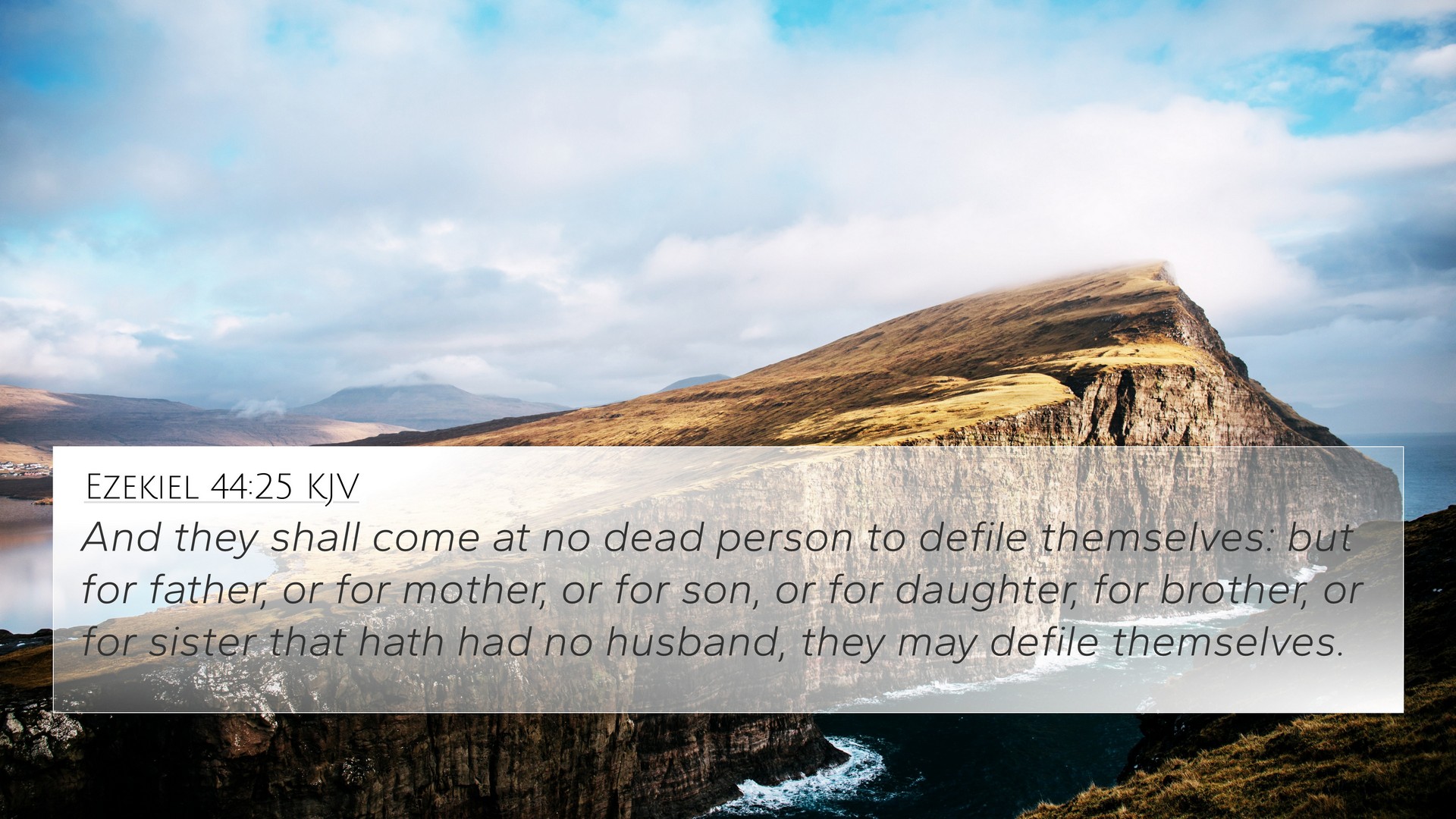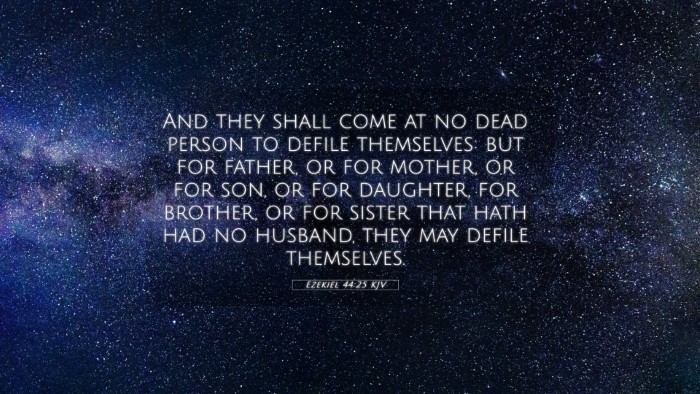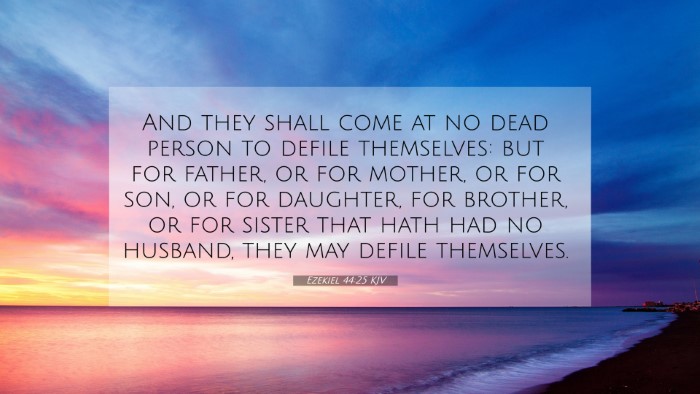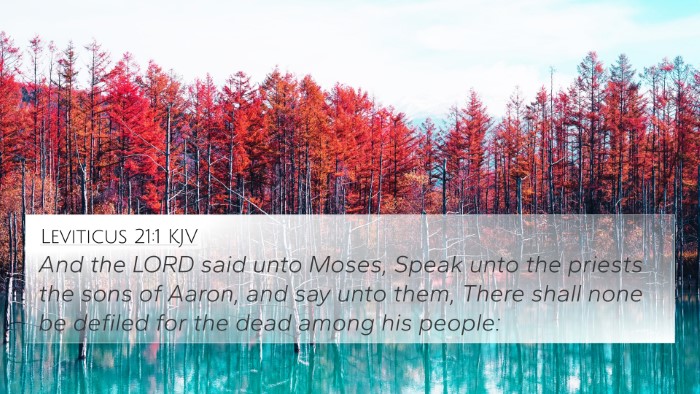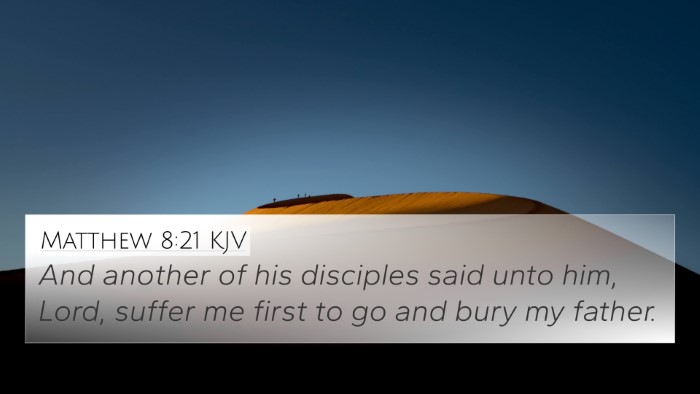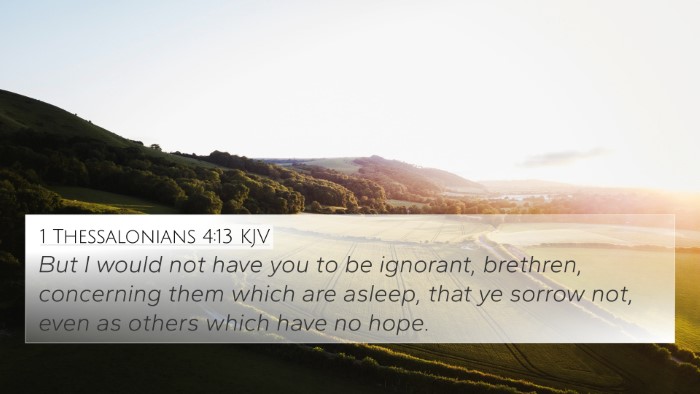Ezekiel 44:25 - Understanding the Verse
Ezekiel 44:25 states: “And they shall come at no dead person to defile themselves; but for father, or for mother, or for son, or for daughter, for brother, or for sister that hath had no husband, they may defile themselves.”
This verse is set within a larger context of laws concerning the conduct of the priests in the temple, particularly relating to their purity and roles following the restoration of Israel.
Summary of Insights from Public Domain Commentaries
The commentaries by Matthew Henry, Adam Clarke, and Albert Barnes provide a rich tapestry of understanding surrounding this verse.
-
Matthew Henry:
Henry emphasizes the importance of ceremonial purity for the priests. This verse restricts their contact with dead bodies, which is a significant aspect of maintaining holiness.
He notes that exceptions are made for immediate family, which showcases the balance between priestly duty and familial love.
-
Albert Barnes:
Barnes delves into the implications of defilement in the context of priestly duties. He points out that engaging with the dead could undermine their sanctity and ability to perform sacred functions.
He further explains that the allowance for grieving one's direct relatives indicates an acknowledgment of human emotion and social connections.
-
Adam Clarke:
Clarke provides a detailed exegesis of the term "defile." He illustrates the severity of defilement and contrasts it with the necessity of mourning for close kin.
He suggests that this reflects God's care for human relationships, even within the stringent laws of priestly conduct.
Cross-References Related to Ezekiel 44:25
Ezekiel 44:25 can be linked to several other verses within the Scriptures, establishing connections that deepen our understanding:
- Leviticus 21:1-3: Discusses the holiness of the priests and their restrictions regarding mourning.
- Numbers 19:11-12: Explains the laws of defilement related to touching dead bodies.
- John 11:33-35: Illustrates Jesus' grief upon seeing the death of Lazarus, highlighting the humanity in mourning.
- 1 Thessalonians 4:13: Encourages believers not to grieve like those without hope, aligning with the theme of hope amid death.
- Hebrews 7:26-27: Refers to the need for a holy priest to intercede, reminiscent of the roles being discussed in Ezekiel.
- Psalm 112:1: Speaks to the blessedness of the one who fears the Lord, establishing a connection to righteousness which is core to the priestly role.
- Luke 8:54-55: Jesus raises a girl from the dead, demonstrating authority over death while respecting social conventions around mourning.
Comparative Bible Verse Analysis
A comparative analysis of these passages reveals a consistent theme: the need for holiness, the significance of mourning, and the deep connections between family ties and spiritual responsibilities.
Such theological reflections prompt believers to consider how they honor both God and human relationships.
Thematic Connections
The themes captured in Ezekiel 44:25 resonate throughout the Bible, including:
- Holiness vs. Defilement: A recurrent biblical theme emphasizing the need for purity in worship.
- Family Responsibility: The Bible often highlights the importance of familial love and connections amidst spiritual duties.
- Mourning and Hope: Scriptures frequently portray mourning while intertwining it with the promise of resurrection and eternal life.
Conclusion
In summary, Ezekiel 44:25 not only outlines rules for priests but reflects a divine understanding of the balance between duty and human emotion.
Through diligent study and cross-referencing with other scriptures, believers can uncover greater meanings within this verse and its applications to life today.
Tools and Resources for Deeper Study
To better understand and study connections between Bible verses, consider using:
- Bible Concordance: Handy for locating specific verses or themes.
- Bible Cross-Reference Guide: Excellent for understanding contextual relationships.
- Cross-Referencing Bible Study Methods: Helps apply these connections in personal study or group discussions.
